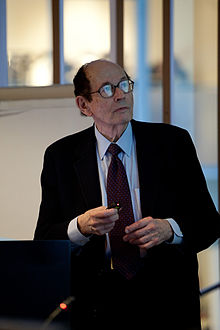 The eminent biologist Gerald Edelman died on May 17, 2014, at the age of 84, according to The New York Times (May 22, 2014). In 1972, Edelman and Rodney R. Porter shared the Nobel Prize for Physiology or Medicine "for their discoveries concerning the chemical structure of antibodies." In addition to immunology, Edelman was interested also in neurobiology, founding the Neurosciences Institute, "a non-profit scientific research organization dedicated to learning about the brain for the benefit of mankind," in 1981, and in consciousness, expounding his ideas in such books as Neural Darwinism (Basic Books, 1987), Bright Air, Brilliant Fire (Basic Books, 1993), and Wider than the Sky (Yale University Press, 2004).
The eminent biologist Gerald Edelman died on May 17, 2014, at the age of 84, according to The New York Times (May 22, 2014). In 1972, Edelman and Rodney R. Porter shared the Nobel Prize for Physiology or Medicine "for their discoveries concerning the chemical structure of antibodies." In addition to immunology, Edelman was interested also in neurobiology, founding the Neurosciences Institute, "a non-profit scientific research organization dedicated to learning about the brain for the benefit of mankind," in 1981, and in consciousness, expounding his ideas in such books as Neural Darwinism (Basic Books, 1987), Bright Air, Brilliant Fire (Basic Books, 1993), and Wider than the Sky (Yale University Press, 2004).
In his work on immunology and consciousness alike, Edelman stressed the usefulness of Darwinian thinking. In Bright Air, Brilliant Fire, for example, he wrote of the immune selective system, "Here is a molecular recognition system that is noncognitive and highly specific, the explanation of which is a marvelous example of population thinking — the essence of Darwinism. Like evolution, it has a generator of diversity ..., a means of perpetuating changes by a kind of heredity ..., and a means of differentially amplifying selection effects." Similarly, he wrote that his theory of neuronal group selection "has definite parallels to Darwinian notions ... In evolution, differences among various organisms' adaptations to the environment lead to differences among reproductive processes, which lead in turn to changes in the frequencies of genes in the population. In neuronal group selection, differences in connectivity, synaptic structure, and the morphology of neurons in the primary repertoire, after confrontation with different correlated patterns of signals from the environment, lead to differences in the probabilities of their responses as groups. This reflects changes in the patterns of their synaptic strengths. There is differential reproduction in one case, differential amplification in the other."
Edelman was born in Queens, New York, on July 1, 1929. He received his B.S. from Ursinus College in 1950 and his M.D. from the Medical School of the University of Pennsylvania in 1954. After stints at the Massachusetts General Hospital and in the U.S. Army Medical Corps, he enrolled at the Rockefeller Institute, from which he received his Ph.D. in 1960. He remained as a professor at Rockefeller University until 1992, when he joined the Department of Neurobiology at the Scripps Research Institute. Besides the Nobel Prize, his honors included the Eli Lilly Award in Biological Chemistry given by the American Chemical Society in 1965, membership in the National Academy of Sciences, and at least sixteen honorary degrees.
